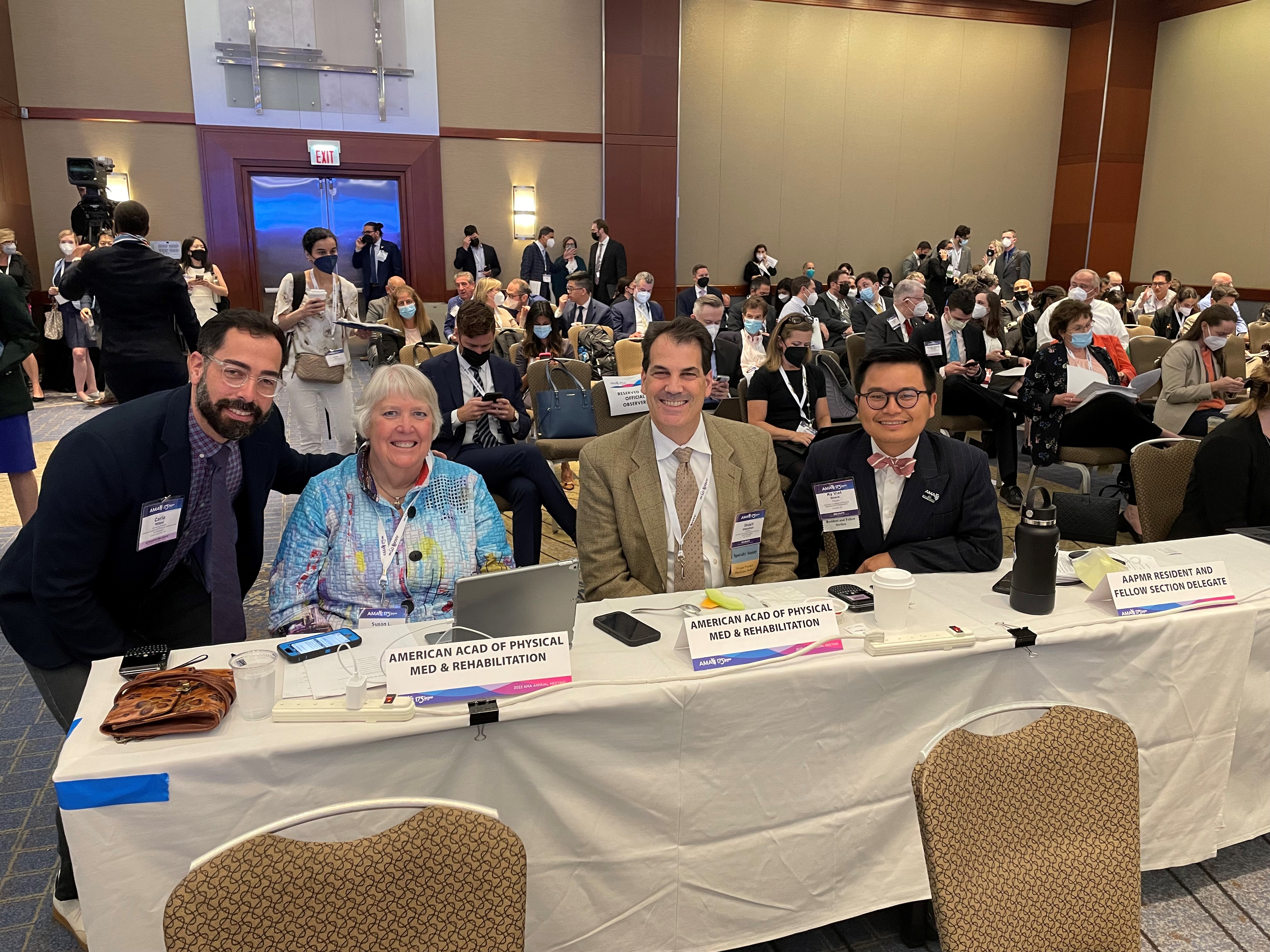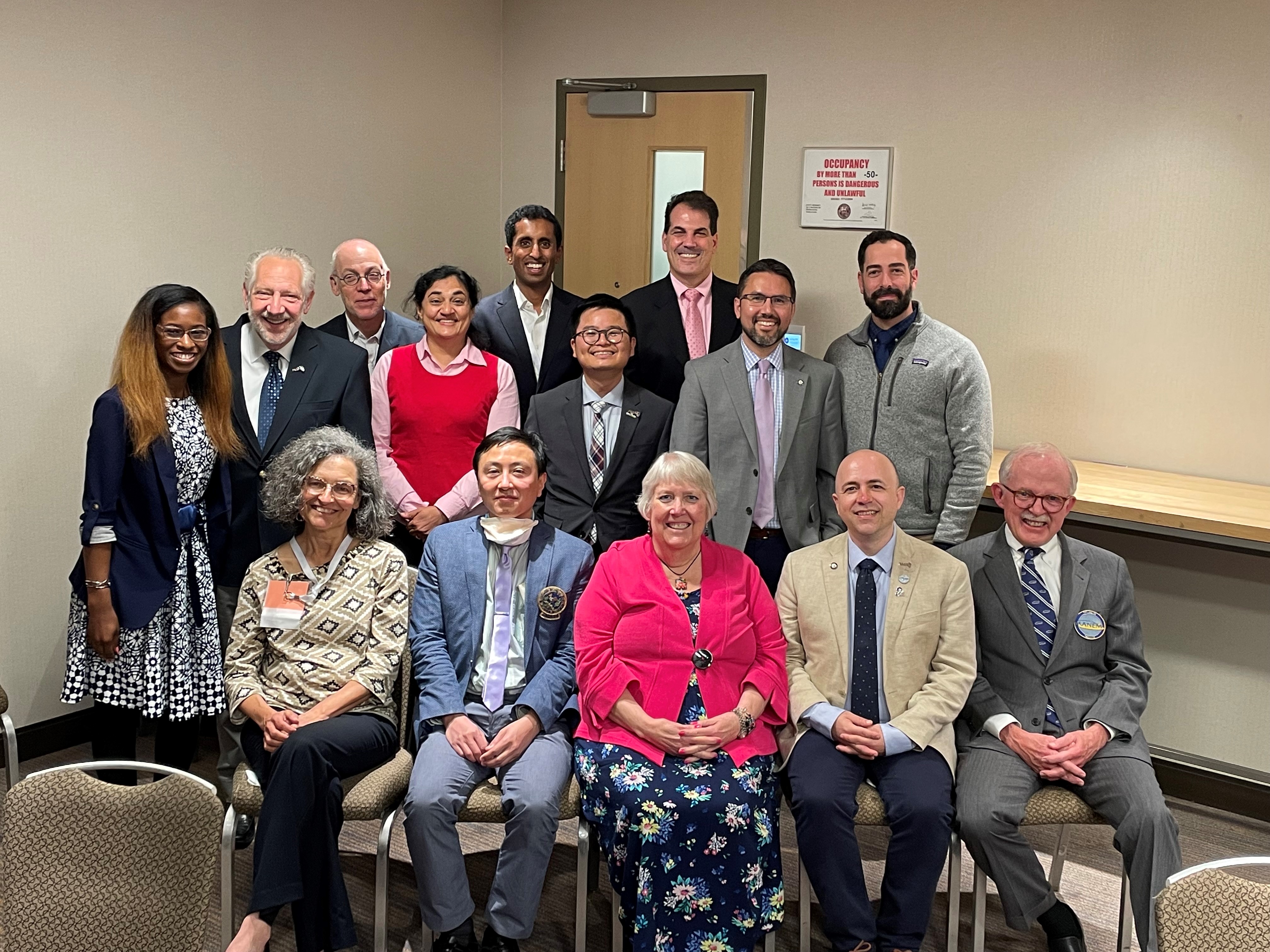On June 10-15, 2022, your AAPM&R delegates participated in the June 2021 Special Meeting of the American Medical Association (AMA) House of Delegates (HOD). The AAPM&R delegation is represented by Drs. Susan Hubbell (AMA Delegate and PM&R Section Council Chair, Neuroscience Caucus Chair), Stuart Glassman (AMA Delegate, Specialty and Service Society Caucus (SSS) Governing Council Member-at-Large, Mobility Caucus President-Elect), Carlo Milani (Young Physician Section Representative, Alternate Delegate), and Ky Viet Quach (Resident and Fellow Sectional Delegate).
Your Delegates successfully advocated for two resolutions to the House of Medicine.
Bundled Payments and Medically Necessary Care
AAPM&R submitted this resolution, cosponsored by the Ohio State Medical Association. This resolution received mixed testimony, with calls for further study on Medicaid episodes of care. The AMA believes that such a comprehensive study will be helpful in guiding future AMA policy development pertaining to payment reform. As such, the following resolution was referred for study, with support of this decision from the AAPM&R delegation:
RESOLVED, That our American Medical Association advocate that coverage rules for Medicaid “Episodes of Care” be carefully reviewed to ensure that they do not incentivize limiting medically necessary services for patients to allow better reimbursement for recipients of the bundled payment (Directive to Take Action); and be it further
RESOLVED, That our AMA study the issue of “Bundled Payments and Medically Necessary Care” with a report back to the AMA House of Delegates to explore the unintended long-term consequences on health care expenditures, physician reimbursement, and patient outcomes (Directive to Take Action); and be it further
RESOLVED, That our AMA advocate that functional improvement be a key target outcome for bundled payments. (Directive to Take Action)
MODIFICATION OF THE MEDICARE APPROPRIATE USE CRITERIA (AUC) PROGRAM
AAPM&R co-authored the original resolution, Repeal or Modification of the Medicare Appropriate Use Criteria (AUC) Program, with the American Association of Neurological Surgeons/Congress of Neurological Surgeons and the American Society of Nuclear Cardiology and a host of additional cosponsors. The Coalition then worked with the American College of Radiology to establish the following compromise language that was accepted by the House of Delegates:
RESOLVED, That our AMA will advocate to Congress to delay implementation of and advance modifications to the Medicare Appropriate Use Criteria (AUC) Program in such a manner that exempts care mandated by EMTALA, adequately addresses technical and workflow challenges that add to clinicians’ administrative burden and practice expenses, maximizes alignment with the Quality Payment Program (QPP), and creates provider flexibility for the consultation of physician-developed, evidence-based and transparent AUC or advanced diagnostic imaging guidelines using a mechanism best suited for their practice, specialty and workflow. (Modify Current HOD Policy)
Your delegates supported an additional policy, Making AMA Meetings Accessible, advocating that:
RESOLVED, That all future American Medical Association meetings be structured to provide accommodations for members and invited attendees who are able to physically attend, but who need assistance in order to meaningfully participate (Directive to Take Action); and be it further
RESOLVED, That our AMA revisit our criteria for selection of hotels and other venues in order to facilitate maximum participation by members and invited attendees with disabilities (Directive to Take Action); and be it further
RESOLVED, That our AMA report back to the HOD by no later than the 2023 Annual Meeting with a plan on how to maximize meeting participation for members and invited attendees with disabilities. (Directive to Take Action)
The AMA also voted to study ways of allowing meaningful participation in all meetings of the AMA by members who are limited in their ability to physically attend meetings.
Your Delegates also weighed in on many additional timely topics related to the COVID-19 public health emergency (PHE) and access to pulmonary rehabilitation, the impact of advance practice providers (APPs) on medical education, the unmatched graduate physician workforce, climate change, firearm violence, and reforming the Medicare Physician Payment System.
Please visit the AMA House of Delegates page of the AAPM&R website to view the full meeting report, once posted.

